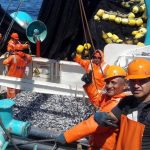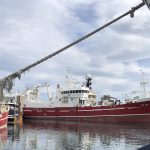The MMO will obtain its legal status from the Marine Bill, which is currently passing through Parliament, and it will represent the biggest change to the way fisheries and marine policy is delivered for many years. For this reason it is important that the NFFO works hard to ensure that its structure, functions and ethos of the new organisation are compatible with and sensitive to commercial fishing. A strong NFFO team participated in the meeting which will be the first of four.
Principal Issues
Marine spatial planning ought to provide a framework for licensing offshore developments in ways that balance various interests in a coherent and consistent way. At present licensing and granting consents for offshore developments like aggregate dredging and wind-farms is a fairly chaotic process with an absence of overall direction and so therefore marine spatial planning should in principle, represent an improvement, although the proof of the pudding is always in the eating.
However, there are undoubtedly dangers for the fishing industry in marine spatial planning. The fishing industry by its nature is fragmented with its activities more widely dispersed than other offshore interests and is especially vulnerable to poorly designed and thought through marine conservation zones. A major challenge is to collate and present information on fishing patterns that demonstrates the industry’s dependence (and therefore prior claim) on key fishing grounds
.
As the MMO will take over quota management functions from the MFA it is particularly important that there is continuity and consistency between the outgoing and incoming organisations during the transition.
It is especially important that from the outset the MMO is guided the three pillars of sustainability – environmental, economic and social.
The new Inshore Fisheries and Conservation Authorities that will replace Sea Fisheries Committees, are so far, an unknown quantity. There is likely to be some consolidation and therefore fewer ICFAs than SFCs but the central issue is the composition of the management committee. It is vital that experienced individuals with a deep knowledge of the fishing industry play a central role, if inshore fisheries management in the future is to be effective.
The Federation will continue to represent the views of commercial fishermen as the process of establishing the MMO continues.








